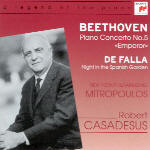You gotta love those folks at Sony France. First they continue with Bernstein Century, and now we have the enticing prospect of a complete Robert Casadesus edition, the first 10 volumes of which have just been released. This disc will appeal not just to fans of this fine pianist, but also to admirers of Dimitri Mitropoulos, who offers accompaniments as dynamic and exciting as the soloists’ playing. He launches the “Emperor” with tremendous gusto, seconded by Casadesus’ refusal to make a meal of his opening flourishes, preferring instead to bind the entire passage together in a single sweeping phrase leading to the allegro. To hear just how effective this is, pay particular attention to the excitement he and Mitropoulos generate when they hit the first movement recapitulation. Casadesus also demonstrates how to extract the maximum harmonic magic from the second subject while remaining in tempo. Here, in short, is “French” playing at its best: clear, logical, and brisk, making its points by subtleties of touch and balanced phrasing rather than heavy underscoring and major fluctuations of pulse. The unsentimental but always elegant slow movement offers another case in point: how refreshing it sounds played as a lyrical prelude to the grandly impulsive (but never rushed) finale, Beethoven’s “un poco mosso” directive taken clearly to heart!
The coupling, while unusual, makes sense in that it reflects the only other extant Mitropoulos/Casadesus recorded collaboration, and it’s no less remarkable. One of the most purely beautiful works ever conceived for piano and orchestra, Nights in the Gardens of Spain ought to be programmed constantly, but you’ll almost never hear it live because (a) it ends quietly, and (b) it’s very, very difficult technically, challenging the soloist to shape and mould the music’s figurations and decorative filigree into meaningfully expressive paragraphs. As such, it plays to Casadesus’ strengths. Listen to the mystery and menace that he and Mitropoulos find in the first movement’s second half, or to the huge passion they bring to its climax. The second movement’s “distant dance” is just that: intensely rhythmic but also soft, with brilliant flashes of light, while the finale charts an unerring curve through to the last, easeful cadence. Sony’s excellent remastering reveals some graininess in the strings in the concerto (recorded in Paris in 1955), but comes across as very clear, close, and impactful in “Nights” (from 1957). In both cases the piano tone reproduces very nicely indeed. Pray this series gets issued domestically. [10/17/2001]
































